Galaxy Watch 7 vs Apple Watch 9: It's a tie

Intro
The official Galaxy Watch 7 unveiling is already in the annals of history! Samsung lifted the curtain and showed us its new foldable flagships, two earbud models, a ring wearable, and two smartwatches. And even though all eyes are on the Galaxy Watch Ultra, the vanilla model will most likely be the better selling device.
Can the Galaxy Watch 7 give the Apple Watch 9 a run for its money, though? That's the question some of you might be asking yourselves, and we're going to try and answer it today. This comparison will be updated with some hard numbers, as we're testing the Galaxy Watch 7 as we type this, but for now, these are our initial impressions.
So, without further ado, let's get to it. This is our Galaxy Watch 7 versus Apple Watch 9 comparison.
So, without further ado, let's get to it. This is our Galaxy Watch 7 versus Apple Watch 9 comparison.
Galaxy Watch 7 vs Apple Watch 9: differences
- Apple Watch 9: Rectangular, 1.69" and 1.9" sizes, sharper resolution.
- Galaxy Watch 7: Circular, 1.3" and 1.5" sizes.
- Apple Watch 9: Custom S9 SiP with dual-core CPU, 4-core Neural Engine, 64GB storage.
- Galaxy Watch 7: Exynos W1000 5-core chip, 3nm process, 32GB storage.
- Apple Watch 9: watchOS 10 (seamless for iPhone users).
- Galaxy Watch 7: Wear OS 5 (wider app selection for Android)
Table of Contents:
- Design and Sizes
- Bands
- Software
- Battery and Charging
- Models and Prices
- Voice Calls and Haptics
- Specs
- Summary
Also see:
- Galaxy Watch 7 review
- Apple Watch Series 10 vs Samsung Galaxy Watch 7: preview of the upcoming battle
- Apple Watch Series 10 vs Series 9: Differences explained
- Samsung Galaxy Watch 6 vs Apple Watch Series 8: which one should you go for?
- Apple Watch Series 9 vs Series 8
Design & Sizes
It's hip to be square
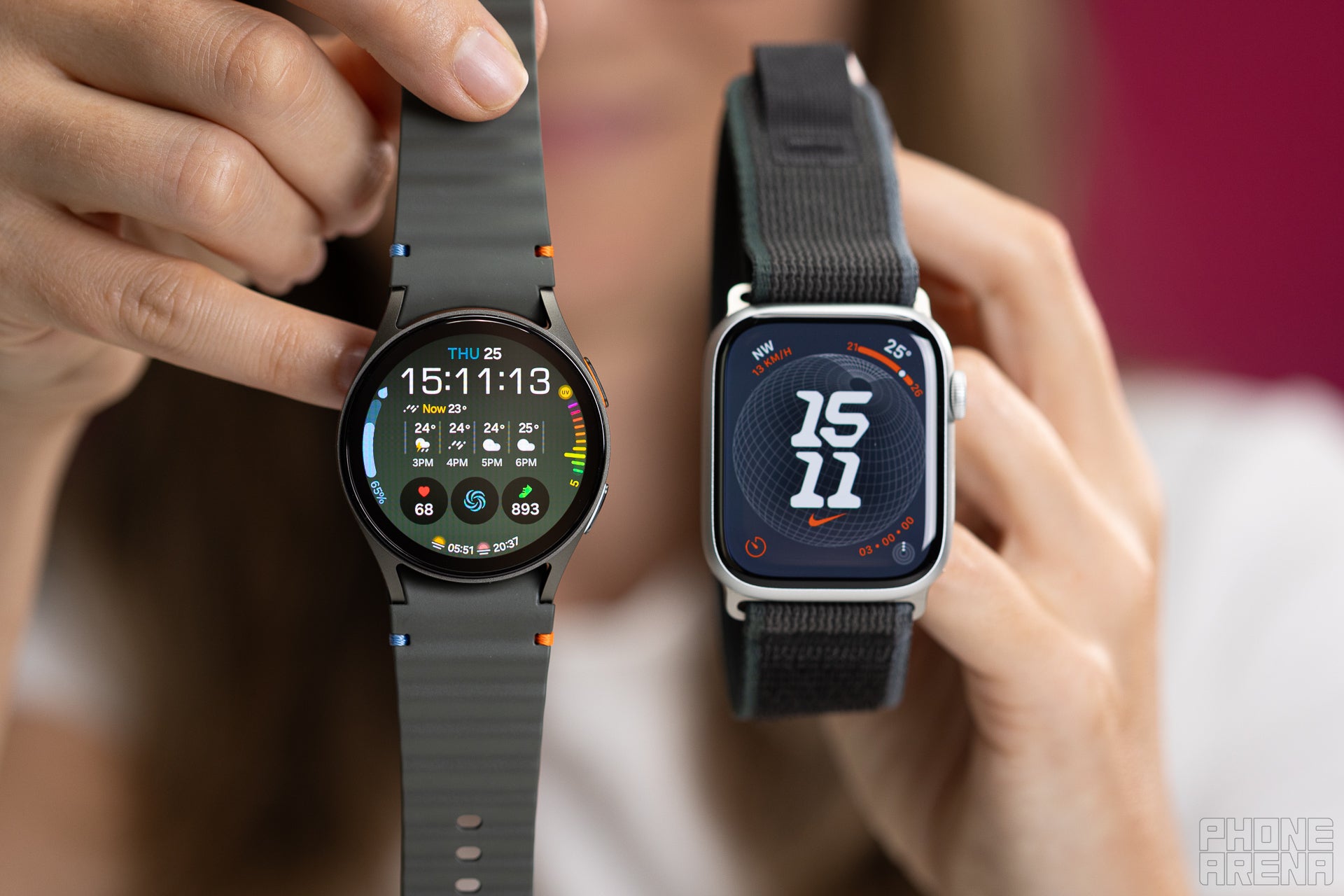
There's a conceptual design difference between the Galaxy Watch 7 and the Apple Watch 9. The former relies on the circular design we all know and love, while the Apple Watch 9 has a square-ish design.
The Apple Watch 9 also comes with two options for materials: an aluminum case or a stainless steel one. The Galaxy Watch 7, on the other hand, relies on aluminum and comes in three colorways - cream, silver, and khaki.
The Apple Watch 9 features Ion-X glass for the aluminum models and Sapphire Crystal for the stainless steel option. The Galaxy Watch 7, on the other hand, comes equipped with Sapphire Crystal glass only, so advantage Samsung in that regard.
The display of the Apple Watch 9 is rated at 2,000 nits peak brightness and 1 nit minimum brightness, and indeed, it's one of the best smartwatch displays in the industry. The brightness of the Galaxy Watch 7 wasn't mentioned in the presentation (Samsung boasted the Watch Ultra having 3,000 nits), so we assume the vanilla model can go up to 2,000 nits, just like its predecessor.
The Apple Watch also comes in two sizes: 41mm and 45mm, while the Galaxy Watch 7 mimics its predecessor with two size options again, slightly smaller at 40mm and 44mm. Samsung fans now have the Galaxy Watch Ultra with its 47mm to satisfy their needs for a bigger watch face, so the Korean company has thought this one through.
The Apple Watch 9 also comes with two options for materials: an aluminum case or a stainless steel one. The Galaxy Watch 7, on the other hand, relies on aluminum and comes in three colorways - cream, silver, and khaki.
The Apple Watch 9 features Ion-X glass for the aluminum models and Sapphire Crystal for the stainless steel option. The Galaxy Watch 7, on the other hand, comes equipped with Sapphire Crystal glass only, so advantage Samsung in that regard.
The display of the Apple Watch 9 is rated at 2,000 nits peak brightness and 1 nit minimum brightness, and indeed, it's one of the best smartwatch displays in the industry. The brightness of the Galaxy Watch 7 wasn't mentioned in the presentation (Samsung boasted the Watch Ultra having 3,000 nits), so we assume the vanilla model can go up to 2,000 nits, just like its predecessor.
Bands
Loops aplenty
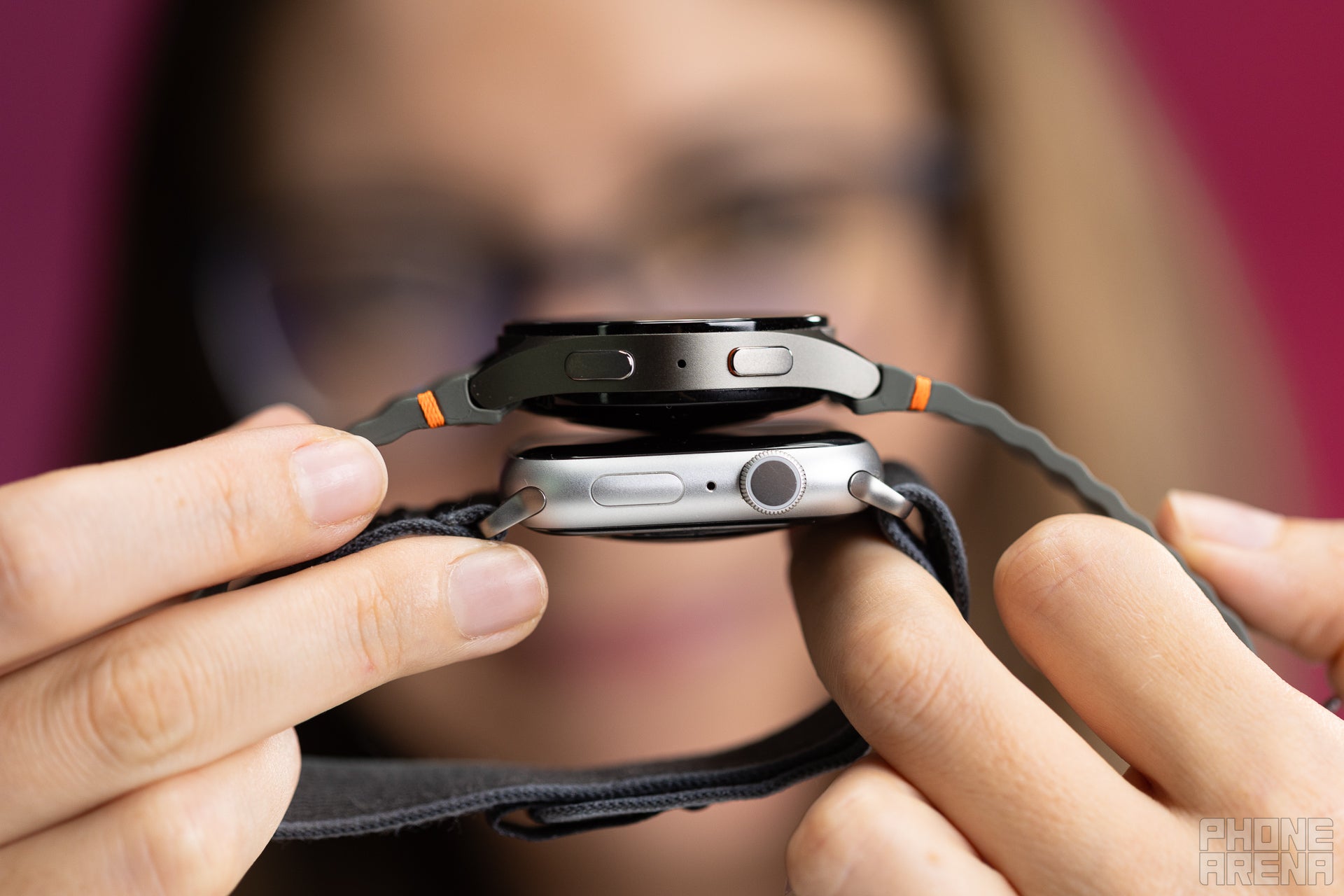
The Apple Watch 9 offers a wide variety of optional bands for every style and taste. There are silicon sport bands, stylish Milanese loops, braided bands, fabric ones with buckle designs, metal bracelets, and many more.
However, despite this abundance, the Galaxy Watch 7 comes with something even cooler. Samsung has retained the same quick-release mechanism from the Galaxy Watch 6 series. This allows, along with Samsung-branded bands (which are also aplenty), for users to slap a regular 20mm or 22mm third party band on the Galaxy Watch.
This is cool because you can in theory use your favorite leather band, for example, on your newly acquired smartwatch, given it's the right size and has the same quick release pin mechanism. Going with the traditional watch lugs gives more freedom when choosing a strap and also has a classic look. That being said, there's no right or wrong here, it's just what you like better.
To sum it up, the Galaxy Watch 7 has an advantage in the fact that it can take standard 20mm and 22mm watch bands, while the Apple Watch 9 uses a proprietary mechanism for its bands.
To sum it up, the Galaxy Watch 7 has an advantage in the fact that it can take standard 20mm and 22mm watch bands, while the Apple Watch 9 uses a proprietary mechanism for its bands.
Software & Features
WatchOS vs WearOS?
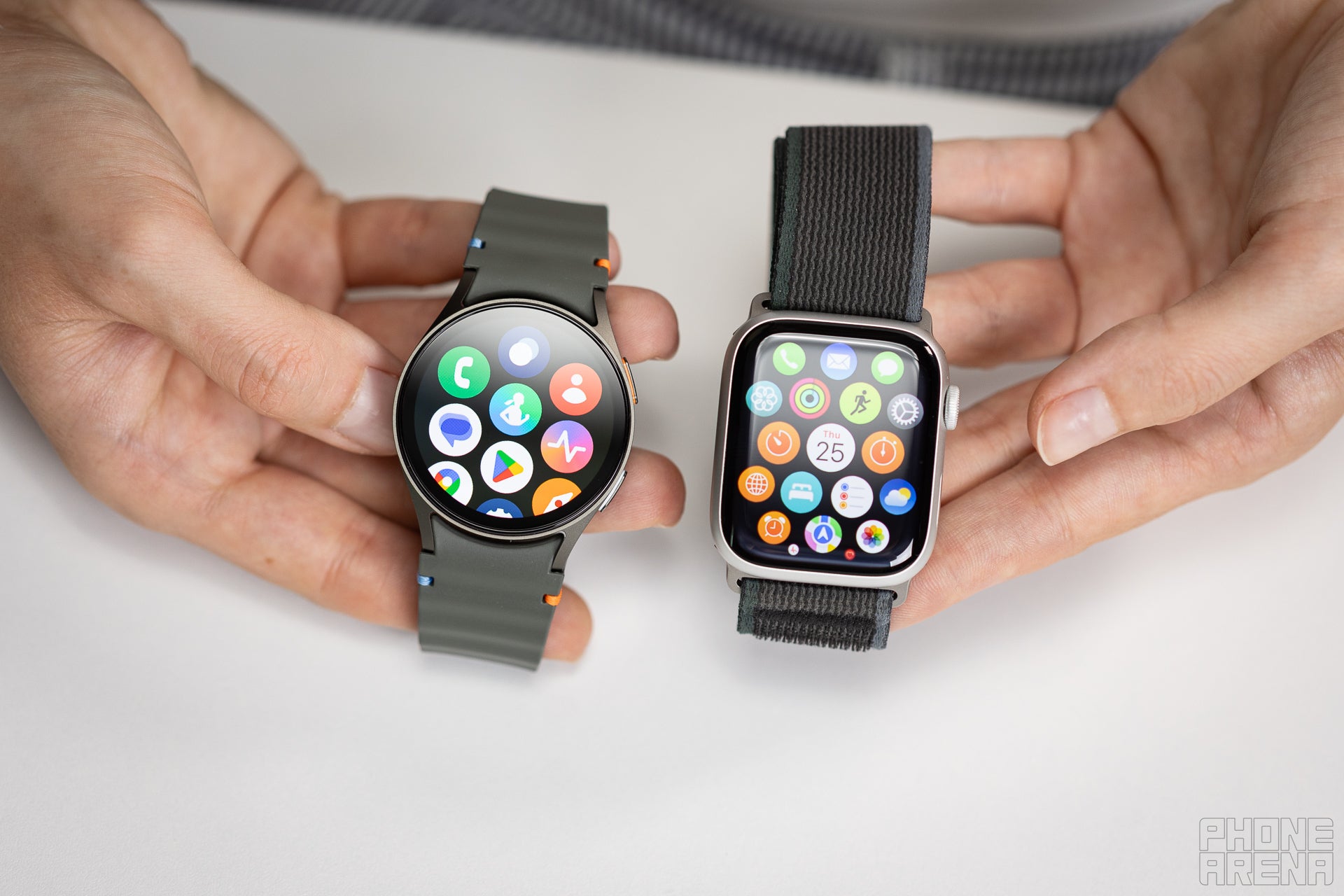
The Galaxy Watch 7 comes equipped with Google's latest Wear OS 5. This software builds upon the extensive array of health-monitoring and wellness functionalities found in previous generations of Galaxy watches, adding even more advanced features.
Familiar metrics such as Sleep Score, Sleep Consistency, Body Composition analysis, can be found on the Galaxy Watch 7, alongside hundreds of workouts, skin temperature readings, and safety features like fall detection and notifications for irregular heart rhythms. There’s also a new metric called the advanced glycation end products (AGEs) index, which evaluates biological aging based on diet and lifestyle.
There's an integration with the newly announced Galaxy Ring baked inside the Galaxy Watch 7 as well, making use of the power and accuracy of the combined sensors on different spots on the hand. Speaking of sensors, the Galaxy Watch 7 features the all new BioActive sensor, which offers 30% more accurate heart-rate detection, and also better sleep tracking and analysis.
Familiar metrics such as Sleep Score, Sleep Consistency, Body Composition analysis, can be found on the Galaxy Watch 7, alongside hundreds of workouts, skin temperature readings, and safety features like fall detection and notifications for irregular heart rhythms. There’s also a new metric called the advanced glycation end products (AGEs) index, which evaluates biological aging based on diet and lifestyle.
All this is backed up by the new Exynos W1000 chipset, a much faster and efficient 3nm processor. Samsung claims it offers 2.7x faster app launch, 3.4x faster single-core performance, and 3.7x multi-core performance compared to the Galaxy Watch 6.
The Apple Watch 9, on the other hand, currently runs on WatchOS 10 and comes with a slew of really cool features. The new double-tap gesture is available, and it can be a very useful way of quickly answering a call or snapping a photo.
The Apple Watch 9 offers amazing integration with iPhone devices, but it won't work with Android phones, so that's the trade off. Other than that, it has sleep tracking, fitness tracking, fall and crash detection, and women's health features such as menstrual cycle tracking.
The Apple Watch 9, on the other hand, currently runs on WatchOS 10 and comes with a slew of really cool features. The new double-tap gesture is available, and it can be a very useful way of quickly answering a call or snapping a photo.
The Apple Watch 9 offers amazing integration with iPhone devices, but it won't work with Android phones, so that's the trade off. Other than that, it has sleep tracking, fitness tracking, fall and crash detection, and women's health features such as menstrual cycle tracking.
The heart-rate accuracy, sleep tracking, and GPS will be assessed after we put both of these models against each other in our rigorous tests. The Apple Watch 9 is famous for its heart-rate sensor, one of the most accurate in the industry on a non-medical device, so it will be interesting to see whether or not the Galaxy Watch 7 will be able to challenge that with its new BioActive sensor.
Battery and Charging
Pretty similar
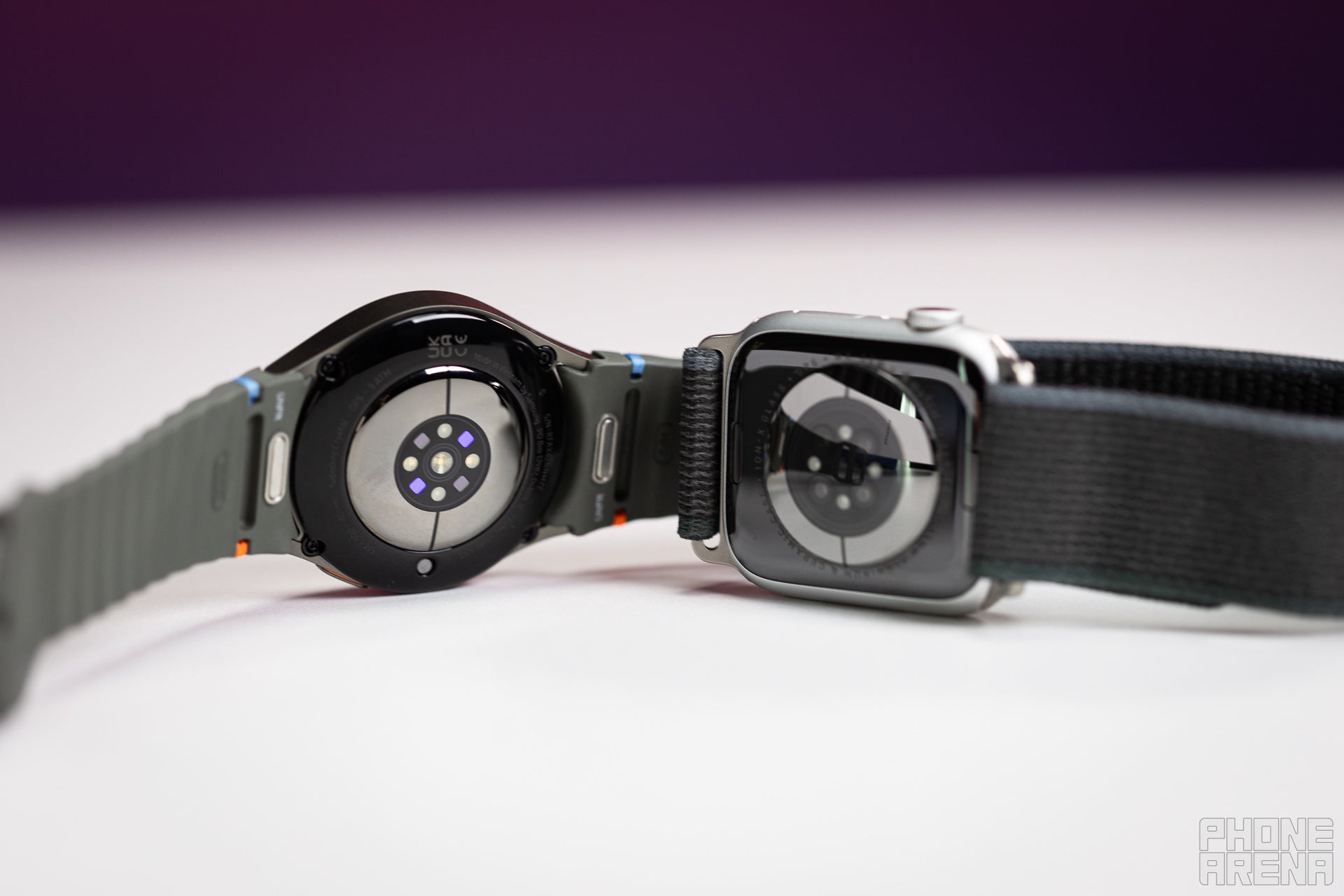
Models and Prices
Here's a quick breakdown of all Apple Watch 9 models and prices:
- Apple Watch Series 9 Aluminum 41mm: from $399 for GPS, $499 for cellular
- Apple Watch Series 9 Aluminum 45mm: from $429 for GPS, $529 for cellular
- Apple Watch Series 9 Stainless Steel 41mm: from $699
- Apple Watch Series 9 Stainless Steel 45mm: from $749
The situation with the Galaxy Watch 7 is coming in four total variants. We have the two sizes, 40mm and 44mm, and an LTE option for each of them alongside the Bluetooth one. So here's the breakdown of the Galaxy Watch 7 models and their price:
- Galaxy Watch 7 (40mm): $299.99 Wi-Fi only; $349.99 Wi-Fi + Cellular
- Galaxy Watch 7 (44mm): $329.99 Wi-Fi only; $379.99 Wi-Fi + Cellular
When it comes to bang for your bucks, the Galaxy Watch 7 is definitely the winner here, especially when we factor in Samsung's trade-in deals and bundles.
Voice Calls and Haptics
Specs
Here's a quick specs comparison for the number nurds out there.
| Specs | Apple Watch 9 | Galaxy Watch 7 |
|---|---|---|
| Models (Size, Weight, Prices) | 41mm / 45mm, both in Wi-Fi or Wi-Fi + Cellular versions | 40mm / 44mm, Wi-Fi + LTE variants |
| Processor, RAM, Storage | S9 chip | Exynos W1000 |
| Software | WatchOS 10 | WearOS 5 |
| Battery and Charging | 18-hour battery life Magnetic charger, 50% in 30 mins | 300mAh for the 40mm version 425mAh for the 44mm version 24-hour battery life |
| Sensors | HR, blood oxygen, altimeter, ECG | HR, blood oxygen, altimeter, ECG BioActive sensor dual-band GPS |
| New features | Fall and crash detection Sleep tracking Fitness tracking Double-tap gesture Apple Pay Notifications Voice calls | Sleep Score Sleep Consistency Body Composition analysis Fall Detection Workout tracking Notifications Samsung Pay Voice call support |
Use PhoneArena's tool for smartwatch specs comparison.
Summary
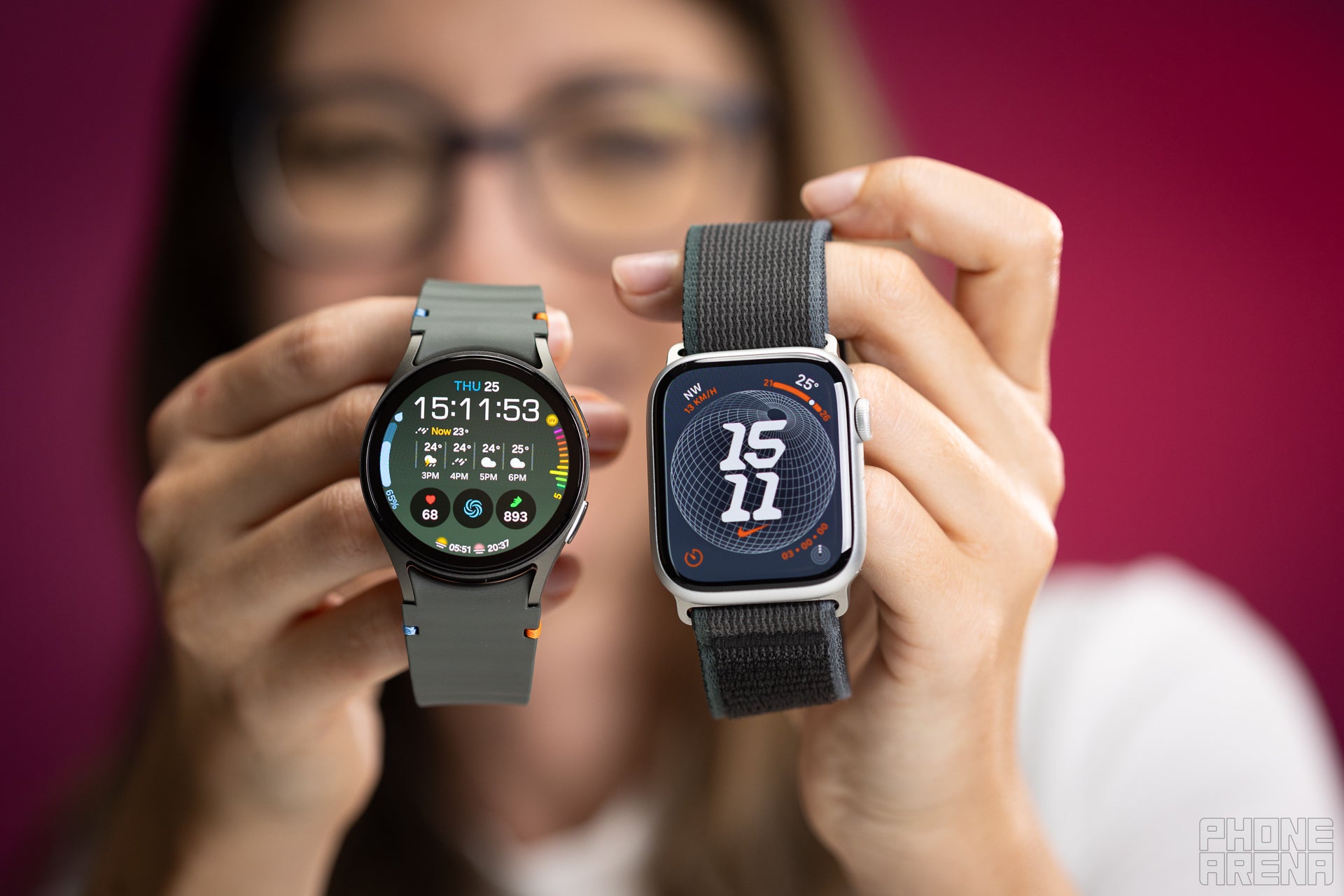
These two wearables are pretty close when it comes to features, although they do things differently when it comes to health tracking. At the end of the day, things such as display brightness, overall build quality, battery life, and even the price are very similar (although the Galaxy Watch 7 is a tad cheaper even in its most luxurious form).
Apple and Samsung are trying to lock down their ecosystems (Apple has already done so, hence no Apple Watch on Android devices), and this limits the possible scenarios where these two would be competing against each other. Obviously, if you rock a Samsung phone you should get the Galaxy Watch 7, and if you have an iPhone, then your weapon of choice should be the Apple Watch 9. As simple as that.
Now, if you own both an Android and iOS device, things might get a bit more complex, but these two are doing pretty much the same things and arriving at the same place using different routes. So, there's no clear winner in this comparison, and we call it a tie.
















Things that are NOT allowed: